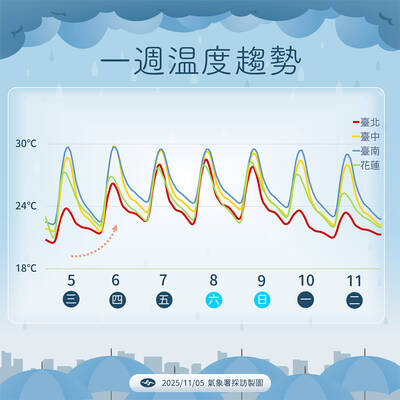To stave off the boredom of long hours of driving and to keep his passengers entertained, a taxi driver in Taipei is offering his fares the possibility of a free journey if they manage to sing a song of his choice correctly.
In a notice displayed on the back of the headrests, taxi driver Tu Ching-liang (涂清涼) informs passengers that they can, if they wish, sing a song on the miniature karaoke machine he has installed in the vehicle.
While that may not be surprising in itself, the fact that the karaoke system’s speakers are located on the outside of the taxi may cause some passengers to raise an eyebrow, or two. The rules also stipulate that if a customer accepts Tu’s challenge, they can either ride for free or receive a prize.

Photo: Tsai Wei-chi, Taipei Times
“Passengers who guess the name of the singer and the song correctly get a prize, and if they sing the song I choose and know both the lyrics and the tune, they get a free ride,” Tu said.
Tu’s taxi-based game takes its cue from the One Million Singer (百萬大歌星) show on TV, in which contestants are invited to memorize song lyrics and melodies.
Tu says a taxi driver’s profession can be rather depressing, but the game adds some joy to his vocation.
“I enjoy a lively environment and I like to sing,” Tu said, adding that his sociable character prompted him to convert his cab into a mobile karaoke in March. Tu said he also enjoys the fact that the game brings him and the customer closer and that it allows them to both enjoy themselves.
Tu said that five years ago he started operating a smaller-scale version of the game in which he would play CDs and ask passengers to guess the singer and song title. Depending on how difficult the song was, Tu said he would deduct between NT$10 to NT$50 from the cab fare.
“On average I drive about 12 hours per day and have an average of about 40 passengers per day,” Tu said, adding that about one in four passengers would take him up on his karaoke musical challenge.
Not a lot of people succeed, but it makes the journey more lively, Tu said, adding that if he is in a good mood he would requests that the customer sing Happy Birthday or allow them to call friends for help in guessing the song.
Tu said his favorite song was Delphine Tsai’s (蔡幸娟) Luan Luan Bang (亂亂夢) — which is sung in Hoklo (commonly known as Taiwanese) — adding that if anyone successfully completed the challenge by singing that song, he would be glad to offer the person a free ride — even if it involved driving from Taipei to Taichung.
Although it might seem as if Tu is getting the shorter end of the deal, he said that a large number of his passengers still tip him and added that in one particularly successful month he received NT$6,000 in tips.

Three Taiwanese airlines have prohibited passengers from packing Bluetooth earbuds and their charger cases in checked luggage. EVA Air and Uni Air said that Bluetooth earbuds and charger cases are categorized as portable electronic devices, which should be switched off if they are placed in checked luggage based on international aviation safety regulations. They must not be in standby or sleep mode. However, as charging would continue when earbuds are placed in the charger cases, which would contravene international aviation regulations, their cases must be carried as hand luggage, they said. Tigerair Taiwan said that earbud charger cases are equipped

Foreign travelers entering Taiwan on a short layover via Taiwan Taoyuan International Airport are receiving NT$600 gift vouchers from yesterday, the Tourism Administration said, adding that it hopes the incentive would boost tourism consumption at the airport. The program, which allows travelers holding non-Taiwan passports who enter the country during a layover of up to 24 hours to claim a voucher, aims to promote attractions at the airport, the agency said in a statement on Friday. To participate, travelers must sign up on the campaign Web site, the agency said. They can then present their passport and boarding pass for their connecting international

UNILATERAL MOVES: Officials have raised concerns that Beijing could try to exert economic control over Kinmen in a key development plan next year The Civil Aviation Administration (CAA) yesterday said that China has so far failed to provide any information about a new airport expected to open next year that is less than 10km from a Taiwanese airport, raising flight safety concerns. Xiamen Xiangan International Airport is only about 3km at its closest point from the islands in Kinmen County — the scene of on-off fighting during the Cold War — and construction work can be seen and heard clearly from the Taiwan side. In a written statement sent to Reuters, the CAA said that airports close to each other need detailed advanced

UNKNOWN TRAJECTORY: The storm could move in four possible directions, with the fourth option considered the most threatening to Taiwan, meteorologist Lin De-en said A soon-to-be-formed tropical storm east of the Philippines could begin affecting Taiwan on Wednesday next week, the Central Weather Administration (CWA) said yesterday. The storm, to be named Fung-wong (鳳凰), is forecast to approach Taiwan on Tuesday next week and could begin affecting the weather in Taiwan on Wednesday, CWA forecaster Huang En-hung (黃恩鴻) said, adding that its impact might be amplified by the combined effect with the northeast monsoon. As of 2pm yesterday, the system’s center was 2,800km southeast of Oluanbi (鵝鑾鼻). It was moving northwest at 18kph. Meteorologist Lin De-en (林得恩) on Facebook yesterday wrote that the would-be storm is surrounded by